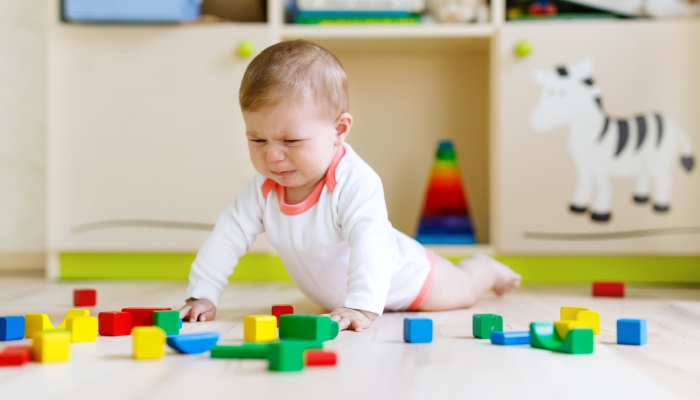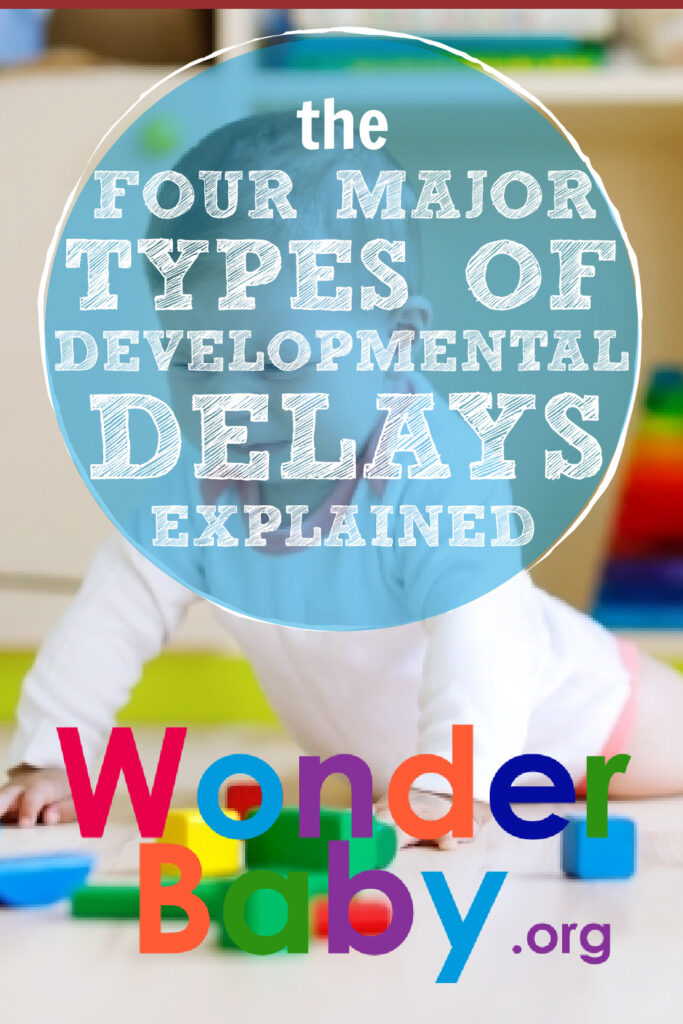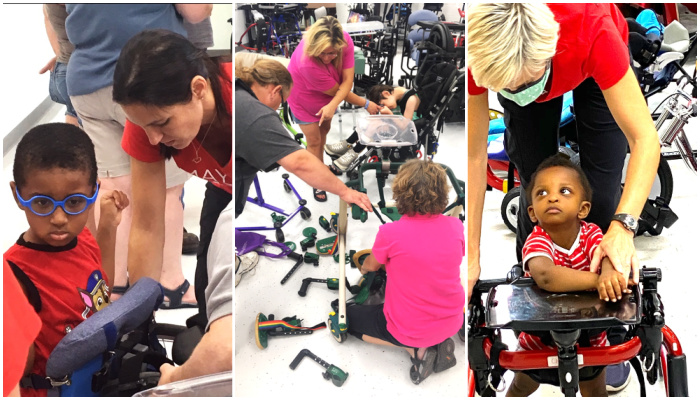The Four Major Types of Developmental Delays Explained

- A developmental delay is when a child is late reaching their developmental milestones compared to their peers.
- Delays are common and children generally catch up.
- There is a wide range of ‘normal’ development.
- Most causes of delays are unknown and research is ongoing, but there are some known risk factors.
- Developmental delays are often temporary, but they can indicate a developmental disorder. Early identification and screening are important for future outcomes.
As a parent, seeing other children mastering milestones before yours can be tricky.
I remember being sent videos of my son’s peers rolling and sitting before he had and feeling like we were behind.
I’d been told that children work to their own timeline. I knew it was normal for them to reach milestones at their own pace. That didn’t stop me from worrying about his development!
‘Developmental delay’ sounded scary to me, but knowledge is power! I found it helpful to learn the types of developmental delay, signs to watch out for, and what I should do if I was worried.
What is a Developmental Delay?
A ‘developmental delay’ is when a child is significantly behind attaining milestones compared to their peers. The four major types of developmental delay are cognitive, motor, speech and language, and social and emotional.
Temporary delays are rarely a reason for concern, but ongoing delays or many missed milestones can be a warning of future challenges.
If your child is experiencing an ongoing delay, they’re not alone. It’s estimated that in the United States, 15% of children have a developmental delay.
They’re different from developmental disabilities, which are usually lifelong. Children with delays often ‘catch up’ with their peers, but early support is crucial. For some children, delays will develop into a long-term disorder.
It’s important to remember that children with delays and disabilities can learn, succeed, and lead positive lives.

What Causes Developmental Delays in Children?
The causes of developmental delays are often unknown and unclear. Research has identified some factors which may play a role, including:
- Genetic disorders – such as fragile X syndrome or chromosomal abnormalities
- Toxins – use of drugs, alcohol, certain medications, or smoking while pregnant
- Maternal infections – including rubella, malaria, and toxoplasmosis
- Birth complications – including premature birth and lack of oxygen during delivery
- Newborn infections – such as meningitis
- Maltreatment – including physical abuse
- Malnutrition – including vitamin D deficiency
What Are the Categories of Developmental Delay?
Developmental delays generally fall into one of four major categories. These are: cognitive, motor, social and emotional, or speech and language delays.
If a child’s delays affect multiple areas, they may have global developmental delay.
Cognitive Delays
Cognitive delay refers to a child’s adaptive and intellectual functioning. It affects their thinking, understanding, and processing of information.
Children with cognitive developmental delays may have difficulties with skills such as:
- remembering a sequence
- following instructions
- solving a problem
Cognitive skills are often used at school, so your child’s teacher may be the first to notice a delay in this area. Common cognitive disorders include dyslexia and dyscalculia.
Motor Delays
Motor skills allow us to move and control our bodies to perform tasks. Motor skill delays fall into two areas: gross motor and fine motor.
Gross motor skills involve the large muscles in our bodies. If your child has a gross motor delay, they may struggle to master physical milestones. These include rolling over, sitting, and walking.
Fine motor skills affect smaller muscle movements, most noticeably in the hands. Children with fine motor delays may struggle with skills like writing and drawing. In babies, you may notice difficulties with holding small objects.
Motor delays could indicate a disorder such as cerebral palsy or muscular dystrophy.
Social and Emotional Delays
Social emotional delays affect the way your child communicates and interacts with others.
You may notice your child has trouble with all or some of the following:
- understanding social cues
- conversations
- changes to routine
- expressing and managing their emotions
They may find overstimulating environments difficult to manage and react to situations in a different way than their peers.
Children with Attention Deficit Hyperactivity Disorder (ADHD) often struggle with social and emotional skills. Autism spectrum disorder is the most common socioemotional disorder.
Speech and Language Delays
A speech and language delay affects the way your child speaks and understands language.
A child with delayed speech and language skills may struggle with:
- expressive speech (using words and gestures to communicate)
- receptive speech (understanding concepts and words)
- both expressive and receptive speech
Oral motor problems are one known cause of speech delays. Hearing difficulties can also contribute, so it can be helpful to ask your child’s doctor for a hearing test if you have concerns.

How Do I Know if My Child Has a Developmental Delay?
You know your child better than anyone, so it’s unsurprising that parents are usually the first to notice a delay.
Children develop at their own pace, so a ‘late’ milestone is not always a cause for concern. If delays are ongoing or in more than one area, it’s worth further investigation.
Most signs of developmental delay are observed before children reach 2 years old. Others may become apparent after your child begins school.
Below are some of the common signs which could indicate a delay.
| Area of Development | Concern |
| Cognitive | Not showing interest in toys Difficulty problem-solving. For example, in solving an age-appropriate puzzle Difficulty remembering information |
| Motor skills | Unable to support own head at around 4 months old Appears stiff, floppy, or has low muscle tone Misses one or more key physical milestones. These include rolling over, sitting unaided, crawling, and walking |
| Social and emotional | Avoids eye contact Reacts differently to peers in interactions with others Delayed emotional skills |
| Speech and language | Avoids using babbling or speech to communicate. It may be difficult to understand their speech compared to peers Doesn’t use gestures such as pointing at 12 months Reduced vocabulary or difficulty understanding words or concepts |
Your well-child care visits should support you in monitoring your child’s progress. Your pediatrician can help you to decide if you need to seek a further developmental assessment.
You can also make use of CDC’s Developmental Milestones website or app. These do not diagnose a developmental delay but help parents to gauge if they need to seek further developmental screening.
If you’re at all concerned about your child’s development, your child’s pediatrician can offer guidance and support.
How to Handle a Child’s Delayed Development
Most delays are temporary and resolve on their own. It’s still important to follow their progress carefully as it can indicate a developmental disability or disorder.
Support for your child’s development should take a holistic approach and may involve a range of professionals.
Research shows that early intervention is vital to supporting your child’s future development. That can feel overwhelming and it can be confusing to know where to start! It’s usually best to consult your primary care provider first to share your concerns.
Treatment may include modifications to their environment, professional support, or home activity suggestions.
Common specialist treatments include:
- Play therapy
- Attachment therapy
- Speech therapy sessions
- Physical therapy
- Behavioral therapy
- Occupational therapy
- Educational intervention (for school-age children)
FAQs
Can children “grow out” of developmental delays?
Most developmental delays in children resolve themselves and are ‘time-limited’. Early intervention is still crucial, as a delay can be a marker for a developmental disorder.
Developmental disorders, such as autism spectrum disorder or cerebral palsy, are different. Disorders might change as your child gets older but usually are lifelong conditions. People with developmental disabilities are still able to thrive and lead fulfilling lives.
How do developmental delays work for children born preterm?
Children born prematurely do have an increased chance of developmental delay.
It’s normal for premature babies to take a little longer than their peers to reach milestones. They may develop these according to their “corrected” or “adjusted” age. Your child’s pediatrician can advise you further about your child’s development if you have any concerns.
How can I track the development of my child with a disability?
Development Journals produced by the UK government can help families to track progress in early childhood.
There are five journals available:
- Deaf Babies and Children
- Babies and children with Visual Impairment
- Babies and children with Down syndrome
- Children with Multiple Needs
- Generic Early Years Development
For tailored support, speak to your child’s doctor or school about your child’s development.
What is the best treatment for a child with a developmental delay?
Treatment options will be individual to your child and should be planned in discussion with your primary care provider.
Certain specialists will be better suited to treat certain delays. For example, physical therapy can be effective for delays in gross motor skills. Speech pathologists are effective at treating speech and language delays.
Children with a global developmental delay may require a whole team approach. This may include multiple specialists supporting them in different areas.

The information WonderBaby provides is not intended to be, and does not constitute, medical or other health advice or diagnosis and should not be used as such. Always consult with a qualified medical professional about your specific circumstances.
Related Posts

Special Needs
5 Spring Cleaning Tips for Families of Children with Disabilities
Spring cleaning is an opportunity to create a more accessible, organized, and supportive space for your child with disabilities. Declutter, deep clean, and refresh!

Visual Impairment
The Gift of Understanding: How a Young Child Helps His Blind Father Navigate Life
When a parent is blind, it’s natural for people to wonder how their sighted child will adapt. Will they struggle to understand their parent’s needs? Will they feel burdened by...

Assistive Technology, Support
May We Help: Engineering Independence for People with Disabilities
May We Help is dedicated to designing and building custom solutions that help individuals of all ages achieve mobility, access, and independence, all at no cost.